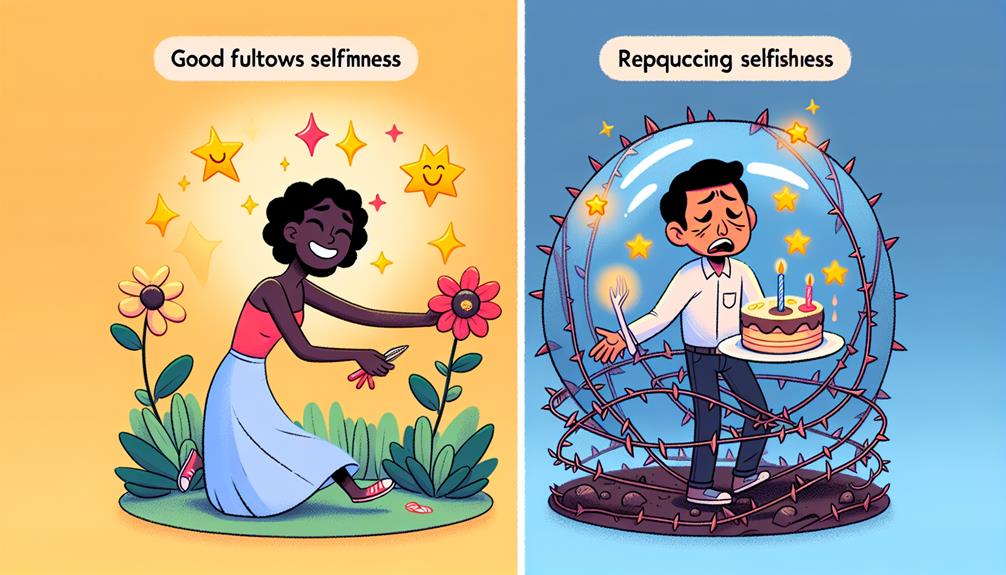Is It Karma Or Kama
In the realm of Eastern philosophy and spirituality, the distinction between karma and kama holds significant weight. While both terms originate from Sanskrit and are deeply rooted in Hindu philosophy, they embody distinct concepts that often intertwine in our daily lives.
Is It Karma Or Kama
Karma, the law of cause and effect, governs the consequences of our actions, shaping our future experiences. On the other hand, kama represents desire and sensual pleasure, influencing our immediate gratifications.
Is It Karma Or Kama
How do these two fundamental principles coexist in shaping our destinies and guiding our paths? Let's explore the intricate interplay between karma and kama to uncover their profound implications on our journey through life.
Is It Karma Or Kama
Key Takeaways
- Karma centers on moral responsibility and shaping one's future through ethical actions.
- Kama focuses on immediate gratification and sensual pleasures in human relationships.
- Finding balance between spiritual growth and sensual enjoyment leads to harmony.
- Understanding the distinctions between Karma and Kama reveals significant cultural values.
Origins and Meanings
Karma and Kama, two concepts deeply rooted in Eastern philosophy and spirituality, have distinct origins and nuanced meanings that differentiate them in their respective cultural contexts.
Is It Karma Or Kama
Karma, originating from ancient Indian religions such as Hinduism and Buddhism, refers to the spiritual principle of cause and effect where one's actions determine their future experiences. It embodies the idea of moral law and cosmic justice, emphasizing the importance of intention and ethical behavior in shaping one's destiny.
Is It Karma Or Kama
On the other hand, Kama, originating from Hindu texts like the Vedas and later developed in the Kama Sutra, pertains to sensual pleasure, love, and desire. It celebrates the pursuit of physical, emotional, and aesthetic pleasures as a legitimate and essential part of human life.
While Karma focuses on the consequences of one's actions on a cosmic scale, Kama centers on the enjoyment and fulfillment of human desires within interpersonal relationships and societal norms. These foundational differences highlight the rich tapestry of beliefs and values present in Eastern thought.
Differences in Concepts
Rooted in distinct cultural origins and embodying nuanced meanings, the concepts of Karma and Kama diverge significantly in their philosophical underpinnings and societal implications.
Karma, originating from ancient Indian spiritual traditions such as Hinduism and Buddhism, revolves around the idea of cause and effect, where actions influence one's future experiences and destiny. It emphasizes the importance of moral responsibility, ethical behavior, and the belief in a cycle of rebirth.
In contrast, Kama, stemming from Indian texts like the Kama Sutra, pertains to the pursuit of pleasure, desires, and sensual gratification. While Karma focuses on the consequences of one's actions on spiritual evolution, Kama centers on the enjoyment of sensual experiences and human relationships.
These differing concepts shape individuals' perspectives on life, guiding their decisions and priorities. Understanding the disparities between Karma and Kama provides insights into the diverse cultural values and belief systems that influence human behavior and societal norms.
Spiritual Versus Sensual
In the exploration of philosophical concepts, the dichotomy between spiritual pursuits and sensual indulgence emerges as a fundamental theme. This age-old debate revolves around the contrast between seeking higher truths and gratifying earthly desires. Here are five intriguing aspects to consider:
- Balance: Striking a harmonious equilibrium between spiritual growth and sensual enjoyment can lead to a fulfilling existence.
- Inner Peace: The pursuit of spiritual enlightenment often promises a sense of inner peace that transcends the fleeting pleasures of the senses.
- Connection: Engaging in spiritual practices can foster a deeper connection with oneself, others, and the universe.
- Gratitude: Embracing spirituality may cultivate gratitude for life's gifts beyond mere material possessions or sensory experiences.
- Purpose: Discovering one's spiritual path can provide a sense of purpose and direction that goes beyond momentary gratification.
Exploring these contrasting yet intertwined aspects can lead individuals on a journey towards self-discovery and a deeper sense of belonging in the world.
Role in Hindu Philosophy
A significant aspect in Hindu philosophy pertains to the intricate interplay between spiritual beliefs and worldly actions. Hindu philosophy encompasses a diverse range of beliefs and practices that aim to guide individuals on their spiritual journey while also addressing their responsibilities and conduct in the physical realm. Central to Hindu philosophy is the concept of dharma, which encapsulates the moral, social, and cosmic order that individuals are expected to uphold. This notion emphasizes the importance of fulfilling one's duties and obligations in a righteous manner, thereby contributing to the harmonious functioning of society and the universe as a whole.
Furthermore, Hindu philosophy underscores the interconnectedness of all beings and the cyclical nature of existence, as reflected in the concepts of karma and reincarnation. The law of karma dictates that every action has corresponding consequences, shaping one's present life and future incarnations. Through understanding and adhering to these philosophical principles, individuals strive to attain spiritual enlightenment and liberation (moksha) from the cycle of rebirth.
Impact on Daily Life
The philosophy of Hinduism influences daily life by guiding individuals in navigating their moral, social, and cosmic responsibilities. This ancient belief system shapes various aspects of daily routines, interactions, and perceptions, fostering a sense of interconnectedness and purpose.
Here are five ways in which Hindu philosophy impacts daily life:
- Karma: Encouraging individuals to act selflessly and with good intentions to shape their future experiences.
- Dharma: Emphasizing the importance of fulfilling one's duties and responsibilities in society.
- Yoga: Providing techniques for physical, mental, and spiritual well-being to maintain balance and harmony.
- Seva: Promoting the value of selfless service and helping others without expecting anything in return.
- Meditation: Offering a practice to quiet the mind, reflect on one's actions, and connect with the divine within and around oneself.
Frequently Asked Questions
How Does the Concept of Karma or Kama Vary in Different Regions of India?
The concept of karma and kama varies across different regions of India due to cultural, religious, and philosophical influences. In some regions, karma is seen as the law of cause and effect, influencing one's actions and their consequences.
Meanwhile, kama is often associated with desire, pleasure, and fulfillment of worldly desires. These variations reflect the diverse belief systems and interpretations found throughout India, shaping individuals' understanding and application of these concepts.
Are There Any Specific Rituals or Practices Associated With Karma or Kama in Hinduism?
In Hinduism, specific rituals and practices are associated with karma. These include performing selfless actions, engaging in meditation and prayer, seeking spiritual guidance from gurus, and participating in religious ceremonies.
The concept of karma emphasizes the idea that one's actions have consequences, both in this life and in future lives. By following these rituals and practices, individuals aim to purify their karma and attain spiritual growth and enlightenment.
Can Karma or Kama Be Experienced by Individuals of Other Religious Beliefs?
Karma, a concept tied to Hinduism and Buddhism, focuses on the idea of cause and effect, where actions have consequences in this life or the next.
Kama, on the other hand, pertains to desires, especially in the context of relationships and pleasure.
While these concepts are deeply rooted in these religions, individuals from other belief systems may also experience similar notions of cause and effect or desire fulfillment, albeit under different terms or frameworks.
Is There a Connection Between Karma or Kama and the Concept of Destiny or Fate?
The concept of destiny or fate is intricately linked to the ideas of karma or kama. Whether viewed through the lens of cause and effect in karma or the pursuit of desires in kama, both paths lead individuals towards their predestined outcomes.
Just as a river flows towards the ocean guided by unseen forces, so too does our journey in life unfold, shaped by the interplay of karma or kama with the forces of destiny and fate.
How Do Modern Interpretations of Karma or Kama Differ From Traditional Beliefs in Hindu Philosophy?
Modern interpretations of karma or kama in Hindu philosophy have evolved to encompass a broader understanding beyond traditional beliefs.
While traditional views often focus on the concept of cause and effect based on actions in past lives, contemporary interpretations may emphasize personal responsibility, mindfulness, and the interconnectedness of all beings.
These modern perspectives offer a more nuanced approach to karma and kama, reflecting changing societal values and philosophical outlooks.
Conclusion
In conclusion, whether it is karma or kama, these concepts have deep roots in Hindu philosophy and play significant roles in daily life. While karma focuses on the law of cause and effect, kama emphasizes desires and pleasure. Both concepts shape individuals' actions and outcomes.
How do these intertwined concepts guide one's spiritual and sensual journey?

